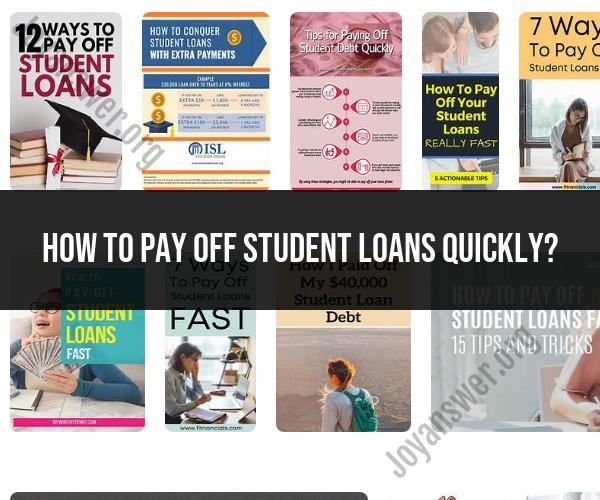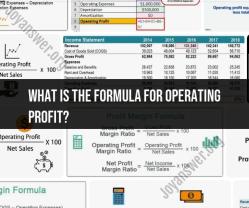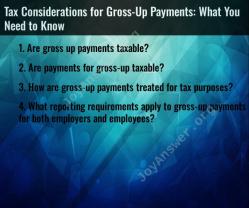How to pay off student loans quickly?
Paying off student loans quickly requires a well-thought-out strategy and disciplined financial planning. Here are some effective strategies to accelerate the repayment of your student loans:
Create a Budget:
- Start by creating a detailed budget to understand your income, expenses, and spending habits. Identifying areas where you can cut back and allocate more money toward your loans is a crucial first step.
Set Clear Goals:
- Establish specific, measurable, and realistic goals for paying off your student loans. Having a clear target and timeline will keep you motivated.
Make Extra Payments:
- Make payments above the minimum monthly requirement. Even small additional payments can significantly reduce the overall interest you pay over time. Consider making payments bi-weekly instead of monthly, which results in an extra payment each year.
Target High-Interest Loans First:
- If you have multiple student loans, focus on paying down the loans with the highest interest rates first. This approach minimizes the interest accruing on those loans.
Snowball or Avalanche Method:
- Consider using either the debt snowball or debt avalanche method. With the snowball method, you pay off the smallest loan first and then apply that payment to the next smallest loan. With the avalanche method, you pay off the highest interest loan first. Choose the one that suits your motivation and financial situation.
Use Windfalls and Bonuses:
- Apply any extra money you receive, such as tax refunds, work bonuses, or gifts, directly to your student loans. Windfalls can make a significant dent in your debt.
Refinance or Consolidate:
- If you have high-interest loans, explore options for refinancing or consolidating your loans. This may lower your interest rate and reduce monthly payments.
Automate Payments:
- Set up automatic payments to ensure that you never miss a due date. Some lenders offer interest rate discounts for auto-debit payments.
Seek Employer Assistance:
- Some employers offer student loan repayment assistance as part of their benefits package. Check with your employer to see if this is an option for you.
Participate in Loan Forgiveness Programs:
- If you work in a field that qualifies for loan forgiveness programs, such as public service or specific healthcare professions, take advantage of these programs to reduce or eliminate your student loan debt.
Side Hustles and Additional Income:
- Consider taking on a side job or freelance work to generate extra income that you can put toward your student loans.
Live Frugally:
- Temporarily adopt a frugal lifestyle by cutting back on non-essential expenses. Redirect the money you save into your student loan payments.
Monitor Your Progress:
- Regularly track your progress to stay motivated. As you see your loan balances decrease, it can provide a sense of accomplishment and encourage you to continue.
Avoid New Debt:
- While paying off your student loans, try to avoid accumulating new debt, such as credit card balances or additional loans.
Remember that paying off student loans quickly requires commitment and discipline. The specific strategy you choose will depend on your financial situation and goals. Be sure to communicate with your loan servicer and explore any available repayment options or benefits. Keep in mind that it's essential to maintain a balance between loan repayment and other financial goals, such as building an emergency fund and saving for retirement.
Paying Off Student Loans Quickly: Strategies for Success
Here are some strategies for paying off student loans quickly:
- Make more than the minimum payment. This is the most important thing you can do to pay off your loans quickly. Even if you can only afford to make an extra $50 per month, it will make a big difference over time.
- Refinance your loans. If you have good credit, you may be able to refinance your loans to a lower interest rate. This can save you thousands of dollars over the life of your loan.
- Consider a part-time job. If you have the time and energy, a part-time job can be a great way to earn extra money to pay down your loans.
- Create a budget. This will help you track your income and expenses so that you can make sure you are putting as much money towards your loans as possible.
- Avoid taking on new debt. This will only make it more difficult to pay off your student loans.
Fast-Track Student Loan Repayment: Tips and Techniques
Here are some tips and techniques for fast-tracking your student loan repayment:
- Make a lump sum payment. If you have the money, making a lump sum payment can be a great way to reduce the amount of interest you pay over the life of your loan.
- Use windfalls to pay down your loans. If you receive a tax refund, bonus, or other windfall, use it to pay down your loans instead of spending it on something else.
- Take advantage of student loan repayment programs. There are a number of government and private programs that can help you pay off your student loans more quickly. For example, the Public Service Loan Forgiveness Program forgives the remaining balance of your federal student loans after you make 120 qualifying monthly payments while working full-time for a qualifying public service employer.
Speedy Student Loan Payoff: Your Roadmap to Financial Freedom
Here is a roadmap to paying off your student loans quickly:
- Calculate how much you can afford to pay each month. This will help you create a realistic repayment plan.
- Prioritize your loans. If you have multiple loans with different interest rates, focus on paying off the loans with the highest interest rates first.
- Make more than the minimum payment. Even if you can only afford to make an extra $50 per month, it will make a big difference over time.
- Refinance your loans to a lower interest rate. This can save you thousands of dollars over the life of your loan.
- Consider a part-time job. If you have the time and energy, a part-time job can be a great way to earn extra money to pay down your loans.
- Create a budget. This will help you track your income and expenses so that you can make sure you are putting as much money towards your loans as possible.
- Avoid taking on new debt. This will only make it more difficult to pay off your student loans.
- Make a lump sum payment. If you have the money, making a lump sum payment can be a great way to reduce the amount of interest you pay over the life of your loan.
- Use windfalls to pay down your loans. If you receive a tax refund, bonus, or other windfall, use it to pay down your loans instead of spending it on something else.
- Take advantage of student loan repayment programs. There are a number of government and private programs that can help you pay off your student loans more quickly.
By following these tips, you can create a roadmap to paying off your student loans quickly and achieve financial freedom.
It is important to note that paying off student loans quickly is not always the best financial decision. You should consider your individual circumstances and goals before making any decisions about your student loans. For example, if you are saving for a down payment on a house, it may make more sense to focus on saving for that goal first. You should also talk to a financial advisor to get personalized advice about your student loans.













